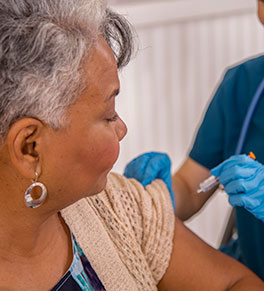COVID-19 vaccines herald an end to the pandemic

With the first supply of COVID-19 vaccines reaching healthcare providers across the nation, UCI Health infectious disease experts say they represent the best hope to end the pandemic that has sickened 72 million people and killed 1.6 million worldwide as of mid-December, 2020.
“Experts believe that at least 70% of people need to be vaccinated before the pandemic will end,” says Dr. Susan Huang, medical director of Epidemiology and Infection Prevention for UCI Health.
For that to occur, supplies need to be made more widely available than those currently being prioritized for frontline healthcare workers, first responders and nursing home residents and their caregivers.
By the end of December, an estimated 20 million people may be able to start the two-dose series, albeit mainly at facilities such as UCI Medical Center with ultra-cold (–70 degrees Celsius) storage capacity.
Vaccine supplies may be more plentiful by April, 2021.
Effective, safe
Perhaps more important, a concerned public needs to know that these vaccines have been shown to be both effective and safe, Huang says.
The Pfizer and Moderna COVID-19 vaccines, which have or are likely to be approved by the U.S. Food and Drug Administration for emergency use, have demonstrated 95% and 94% effectiveness, respectively, in clinical trials of more than 70,000 people.
The phase 3 clinical trials also showed that the vaccines are safe, Huang says. Both the Pfizer and Moderna vaccines produce flu-like side effects in many people, but these usually last no more than two days.
Those side effects — fatigue, headaches, muscle aches, chills and joint pain — indicate a successful immune response.
The vaccines do not contain the COVID-19 virus, but rather mRNA (messenger ribonucleic acid) that instructs the body to make a protein resembling the virus’ tell-tale spike, then generate antibodies to kill the virus. The mRNA code is also destroyed by the body.
First doses for health workers
Huang said UCI Health personnel will begin receiving vaccinations this week, especially healthcare workers who work directly with potential and confirmed COVID-19 patients, as well as those who are immunocompromised. The vaccinations aren’t mandatory, she says, but they are highly encouraged.
It’s important for everyone to know that the currently developed COVID-19 vaccines do not involve live SARS-CoV-2 virus, including the mRNA vaccines, Huang says.
“They cannot give you or anyone else COVID-19, and the vaccine does not make you contagious.”
Related stories
Explore further
Browse more blog posts by topic.




